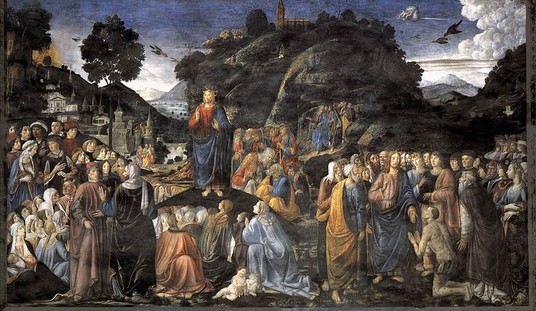This morning’s Gospel reading is Matthew 28:16–20:
The eleven disciples went to Galilee, to the mountain to which Jesus had ordered them. When they all saw him, they worshiped, but they doubted. Then Jesus approached and said to them, “All power in heaven and on earth has been given to me. Go, therefore, and make disciples of all nations, baptizing them in the name of the Father, and of the Son, and of the Holy Spirit, teaching them to observe all that I have commanded you. And behold, I am with you always, until the end of the age.”
How many readers have had to create or learn “mission statements” as part of their jobs? Mission statements became a corporate fad a generation ago, part of an attempt to motivate employees and connect them to core business considerations. In the environments in which I worked, the process required consensus among the team, most of whom were pretty sure that our main function wasn’t to come up with mission statements. These led to some conflicts that were, in retrospect especially, pretty hilarious. We had a big debate over the difference between the word “most” and “utmost,” for instance. (Veteran readers of this site will not be at all surprised to know that I was on Team Utmost.)
That demonstrates the difference between mission statements and the actual mission. In my last job, I told people who worked for me that their mission was to save lives and protect property. It didn’t matter which function they performed in doing those tasks; that was our mission as an organization, and that is what each one of us did in our own way. And every day, we could come to work knowing that whatever particular actions we took, we were there to save lives and protect property. To the utmost, I guess.
We see the difference in our first reading from Deuteronomy, Moses’ great explication of the history and mission of Israel. Their mission, Moses tells the Israelites, is to worship the Lord as the one and only God and to keep his commandments. Moses warns the Israelites not to fall into their previous failures; in the preceding chapters, Moses reminds them that at one time they refused to enter the promised land, having insufficient trust in the Lord. Moses himself was forbidden to enter it for his own weakness in leading the people to follow Him.
Later in Deuteronomy, Moses explains that Israel has a mission as a nation set apart from others. He warns the Israelites not to get caught up in worldly matters, but to remain true instead to each other and to the Lord. Otherwise, they would get caught up in their idolatry and fail in their mission, which eventually was to be a beacon of light to all nations when David became king. The long term plan was for Israel to be a nation of priests for the Lord and for all nations to come to Jerusalem to learn of God’s Word for salvation.
That was their mission, but the Israelites failed in it. Even during the apex of the kingdom under David and Solomon, they turned their eyes away from the mission in favor of worldly considerations and temporal power of their own devising rather than rely on the Lord. Starting with Solomon, they tried to acquire power on their own through alliances and royal intermarriages, setting up temples to idols. As Moses warned in Deuteronomy, their grip on the land eventually failed, and “the Lord will scatter you among the peoples, and you will be left few in number among the nations where the Lord will drive you” (Deut 4:27).
But the Lord understood this, and all of this worked to His own ends, as we see in our Gospel reading today. By the time of Christ’s Passion and Ascension, the northern kingdom had been utterly vanquished, and Judea would soon suffer a similar cataclysmic fate in which the temple would fall, this time for good. Before Jesus ascended to heaven, He gives the eleven remaining disciples the Great Commission at the end of Matthew’s Gospel, in which He reveals the mission for which He has prepared them. This is not a mission statement, but instead a command to mission — a mission to save souls and protect against their destruction.
How is this to be accomplished? The Lord works through Moses’ prophecy in Deuteronomy 4:27. The failure of the last of the Israelite kingdoms will be the template for the new church, which will bring salvation to the nations rather than the nations to salvation. The Lord will scatter His people among the nations, few in number, but with the Word of God among them to convert the peoples. Moses led his people into the Promised Land; Jesus led his people out into the world to bring the Promised Land to all.
Thus began the church and the organized effort to bring the Gospel of salvation to all nations. Even at its start, the eleven disciples, soon to be apostles, did not act on their own. They had friends who followed Jesus less publicly, such as Joseph of Arimathea and Nicodemus, among others. After Pentecost, the group organized itself in a more formal way, finding new roles as needs arose. Seven deacons were appointed, for instance, in order to allow the apostles to specialize more in their own tasks. One of these deacons, Stephen, became the first martyr of the church after Jesus’ ascension. The apostles chose successors, passed their charism to priests, and the laity took on all sorts of tasks as well.
All of these offices, formal or informal, had specific roles, specific responsibilities. In the church today, we have ministries and employees who do all sorts of different things. By our baptism, we all have the same mission that Jesus gave the disciples in today’s Gospel — Go, therefore, and make disciples of all nations.
That is our mission, and our job description as baptized disciples of Christ. We don’t need a mission statement, but just the love of God, of each other, and the gifts of the Holy Spirit to accomplish it. To the utmost, unless someone on this committee has a better word.
The front page image is a detail from “The Ascension of Christ,” a 16th-century painting attributed to Dosso Dossi. Via Wikimedia Commons.
“Sunday Reflection” is a regular feature, looking at the specific readings used in today’s Mass in Catholic parishes around the world. The reflection represents only my own point of view, intended to help prepare myself for the Lord’s day and perhaps spark a meaningful discussion. Previous Sunday Reflections from the main page can be found here. For previous Green Room entries, click here.







Join the conversation as a VIP Member